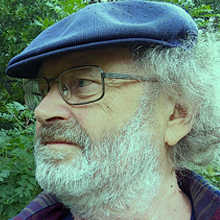Este vis a vis es un lujo, tengo de invitado a Klaus Pitter. ¿Qué decir de él? Bueno, googleando se encuentran estos datos:
Nació en Austria en 1947. Estudió artes gráficas en la Universidad de Artes Aplicadas de Viena. Es caricaturista e ilustrador. Ha ilustrado varios libros sobre educación ambiental y muchos libros escolares. Sus dibujos se publican periódicamente en las revistas austriacas. Ha participado “pleinairs” internacionales en república Checa y Ucrania.
Durante su carrera ha obtenido premios y distinciones internacionales por su obras en Croacia, Hungría, Alemania, Serbia, Turquía, Bélgica, Rumania, Macedonia, Israel, Luxemburgo, República Checa, Brasil, Argentina, Irán, Egipto, Italia, Kosovo y Polonia (y dos y tres veces ha sido galardonado en esos países).
Ha realizado innumerables exposiciones individuales y colectivas y ha sido jurado en unos cuantos concursos internacionales también.
Con ese curriculum es un honor tenerlo aquí. Pero además, lo invité también porque me encanta su obra y porque leí su conversación con nuestro amigo y colega Osvaldo Macedo de Sousa, que publicamos en Humor Sapiens y me fascinaron sus respuestas.
Aquí vamos entonces…
PP: Maestro, ¿le gusta que le hagan entrevistas?
PITTER: Depende. Veo un dibujo mío y abajo leo mi nombre. Una entrevista como ésta me da la oportunidad de explorar la conexión entre mi persona y el producto en el papel de dibujo.
PP: Perfecto, me hace sentir más cómodo preguntando. Pero Pitter, no estoy seguro de si lo presenté bien, por eso me gustaría que usted mismo lo hiciera, por si algún lector de Humor Sapiens no lo conoce. Pero por favor, sin muchos datos. Sería más bien cómo le gustaría que lo conociesen, que lo recordasen.
PITTER: Los datos básicos son que soy un ilustrador y caricaturista, nacido en Austria y viviendo en Viena desde mis estudios en la Universidad de Artes Aplicadas. He dibujado caricaturas desde muy joven y nadie intentó cambiar mi forma de hacer arte. Independientemente de lo que hiciera, como diseñar una revista infantil o ilustrar libros escolares, inventar mis propias historias o caricaturas seguía siendo el centro de atención. Imagínese a una persona que se levanta por la mañana y, después del desayuno, corre hacia la mesa de dibujo, o se siente incómoda en la sociedad mientras surgen historias en mi cerebro que quieren plasmarse en papel.
PP: Me lo imagino, porque padezco esa “enfermedad”. Oiga, ¿cómo surgió su vocación por la caricatura? ¿Tiene familiares artistas que lo pudieron estimular?
PITTER: No ha habido artistas en la familia; mi padre era profesor y tenía mucha imaginación. También era fanático del Pato Donald; estoy seguro de que esto fue una gran influencia. Y a mi madre le gustaban mis dibujos en sus libros de cocina cuando yo era niña. Esto parece haberme animado a ilustrar libros más tarde… y a cocinar.
Otra influencia fue un libro, "Quién es quién" de dibujantes, que recibí cuando tenía unos quince años. Me encantaba estudiar los caminos de vida de mis ídolos de esa época.
Algunos de mis primeros dibujos se publicaron en periódicos y revistas locales y alemanes; esto definitivamente fue alentador.
PP: Bueno, yo siempre digo que el Pato Donald, El Pájaro Loco y las Dos Urracas formaron mi sentido del humor de niño. Y dígame, ¿ha evolucionado su obra desde los inicios hasta hoy? No me refiero a calidad, porque es obvio que la practica y la experiencia determinan que uno vaya mejorando. Me refiero a si ha evolucionado su estilo en cuanto a forma y a intereses en los contenidos.
PITTER: Mi estilo en épocas anteriores estuvo influenciado por caricaturistas que admiraba, como Sempé, Bosc, Searle y otros. Más tarde descubrí que el contenido define el estilo: mi estilo cambia un poco cuando estoy ilustrando un cuento para niños, una historia cómica para adultos o una caricatura para algún concurso de caricaturas. Hoy en día no me preocupa tanto mi estilo: el dibujo tiene que transmitir mi idea original lo más claramente posible.
En cuanto al "contenido", trato de no evaluar demasiado: las ideas que surgen son un desafío para plasmarlas en imagen.
PP: ¿Cuál caricatura le interesa más, la que hace con textos o sin palabras? ¿Por qué?
PITTER: Prefiero las caricaturas sin palabras; no se necesita traducción para entenderlos en todo el mundo. Pero a veces surgen ideas que no se pueden transmitir sin palabras; trato de mantener la redacción lo más simple posible.
PP: Si le tuviera que explicar el significado de humor gráfico a alguien que nunca ha vista una caricatura en su vida, ¿cuál sería esa definición suya?
PITTER: Es difícil de explicar... Le pediría a esta persona que me dijera lo que ve. Creo que no existe una manera correcta de entender una caricatura. Las personas tienen diferentes tipos de humor, o ninguno en absoluto... Tal vez hablando sobre el dibujo esta persona pueda descubrir si tiene sentido para él... lo cual no tiene por qué ser divertido.
PP: Yo soy de la opinión que la caricatura tiene que provocar, aunque sea mínima, una sonrisa o una sonrisa interior, de lo contrario no es humor gráfico. Y para mí la caricatura es una forma de humor. Pero bueno, es un tema para discutirlo en otra ocasión, ¿no es cierto? Volvamos a lo nuestro… Veo que trabaja la sátira política y la social, pero también el humor llamado “blanco” o “general”. ¿Cuál de las dos modalidades le gusta más?
PITTER: Mi preferencia cambia de un tipo de humor social a uno más "filosófico" y viceversa. A mí mismo me resulta agotador que me digan todo el tiempo qué es políticamente "correcto" o cómo debería funcionar mi conciencia social o ecológica, así que cambio a un humor más "general"... hasta que mi voz interior me dice que ya era suficiente. flotando en esferas filosóficas y erauna vez más, para sacudir la conciencia del mundo.
PP: Me gusta esa forma de crear, sin presiones ni ataduras. Maestro le hago una pregunta de moda, ¿tiene límites el humor? Y aprovecho para preguntarle, ¿se autocensura mucho o poco?
PITTER: Estoy feliz de vivir en un país donde, en cierto grado, puedo definir hasta dónde puede llegar el humor. No uso las caricaturas como arma para ofender a personas o grupos; esto no es lo que realmente quiero hacer, por lo que no es necesaria mucha autocensura. Pero debo confesar que a veces surgen ideas que después de un rato de reflexión creo que es mejor no realizar. La autocensura me dice que es mejor no decirles qué tipo de ideas son estas…
PP: Ja, ja. Está bien, oiga, ¿Cómo ve la situación del humor gráfico en la actualidad, tanto en Austria con en el mundo en general? ¿Y es optimista o pesimista en cuanto al futuro de este arte? ¿Piensa que Internet es la solución?
PITTER: El mundo está lleno de pros y contras y de conflictos; no faltan temas para los caricaturistas. Se podría trabajar desde la mañana hasta el anochecer y toda la noche para cubrirlo todo... Pero es difícil sobrevivir si las únicas recompensas son los Zertifikates y los Premios a la Excelencia de los concursos mundiales de dibujos animados. Los editores están reduciendo sus presupuestos en todas partes, sobre todo en los países pequeños como Austria, donde no hay un gran público lector. Las exposiciones son recorridos más o menos de buena voluntad, ya que a la gente le gusta ver dibujos divertidos, pero no hay voluntad de comprar. Por suerte, pude ganarme la vida como ilustrador y existe una buena influencia mutua con las caricaturas.
Quizás Internet podría ayudar... si tus dibujos animados fueran recompensados financieramente después de una cierta cantidad de clics, como canciones o videos.
PP: Esa podría ser una solución. Me gusta. Bueno, para no seguir en este vis a vis con un tono de tristeza, ¿puedes contarme alguna anécdota divertida o curiosa relacionada con su profesión?
PITTER: Alrededor de 1968 yo trabajaba para una revista juvenil de izquierda en Austria. Una vez había un titular: "Todos los profesores deberían ser asesinados" y lo ilustré con un gato Fritz (robado... lo siento, R. Crumb) lanzando un geotriángulo hacia un profesor. La próxima vez que visité a mis padres en este pequeño pueblo austriaco donde mi padre era profesor, la bienvenida fue un poco congelada.
PP: Ja, ja, claro, no se puede recibir bien a un asesino docente. Maestro, ¿se le ocurre alguna pregunta que no le hice y que le hubiese gustado que se la hiciera? Si es así, ¿podría responderla ahora?
PITTER: He estado dando cursos sobre dibujo de dibujos animados y cómics con niños en Viena. De vez en cuando conocí a jóvenes realmente talentosos. Uno de ellos pidió a sus padres que lo enviaran a una escuela de arte para convertirse en ilustrador. Sus padres me preguntaron preocupados si podría vivir de la ilustración y les aseguré que se abriría camino… desde mi convicción de que es mejor hacer lo que realmente quieres que esperar algo así como un “trabajo seguro”.
PP: Toda la razón. Bueno, finalmente, ¿podría decirles unas palabras a nuestros lectores de Humor Sapiens?
PITTER: Me gustaría agradecer a los lectores de Humor Sapiens por dedicar su tiempo a leer mis respuestas a esta entrevista. Ha sido un intento de organizar mis pensamientos sobre lo que he estado haciendo con mayor insistencia durante mi vida, dondequiera que estuviera... en la escuela, en el servicio militar, en vacaciones, en el hospital... dondequiera que me encuentres, me encontrarás dibujando. . Les deseo a todos una actividad fascinante que les brinde un punto de apoyo similar en la vida.
PP: Estimado Klaus, es un honor haber realizado este vis a vis con usted. Mil gracias por su tiempo y buena disposición. Le deseo mucha salud y que continúen los éxitos.
PITTER: Muchas gracias por elegirme como "víctima" para su entrevista, gracias por sus preguntas bien consideradas y por su trabajo al servicio del humor.
(Este texto fue traducido al Español por Google Translate)
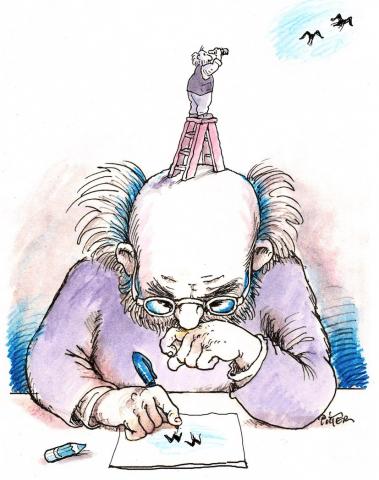
Bird-sketching
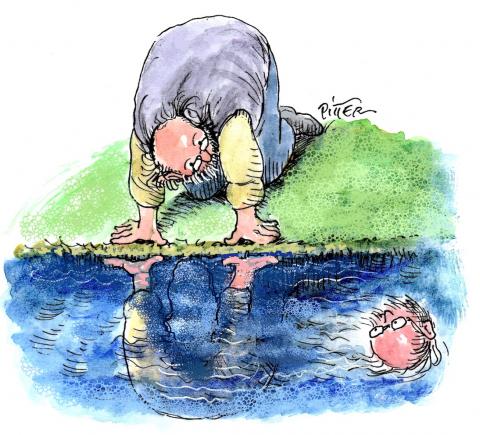
Floating-away
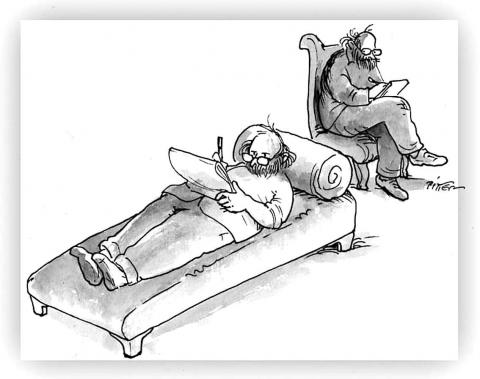
Inter-view
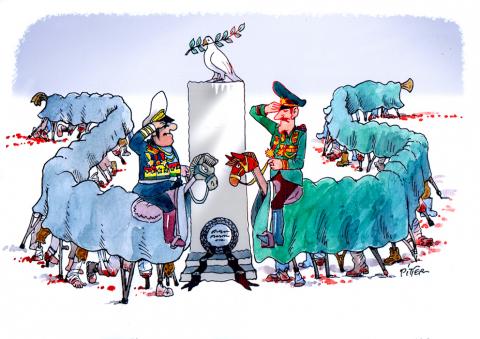
Me-morial
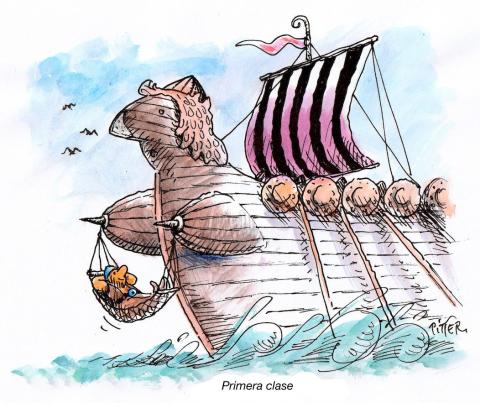
Primera-clase
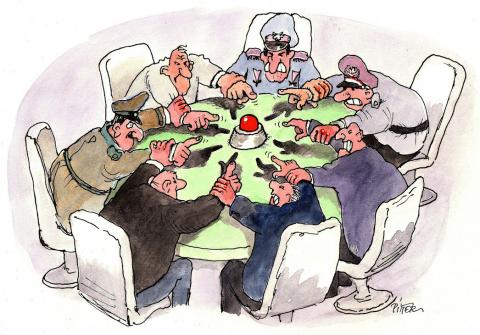
Red-button
Interview with Klaus Pitter
By Pepe Pelayo
This vis-à-vis is a luxury, I have Klaus Pitter as a guest. What to say about him? Well, by googling you will find this information:
He was born in Austria in 1947. He studied graphic arts at the University of Applied Arts in Vienna. He is a caricaturist and illustrator. He has illustrated several books on environmental education and many school books. His drawings are published periodically in Austrian magazines. He has participated in international pleinairs in the Czech Republic and Ukraine.
During his career he has obtained international awards and distinctions for his works in Croatia, Hungary, Germany, Serbia, Turkey, Belgium, Romania, Macedonia, Israel, Luxembourg, Czech Republic, Brazil, Argentina, Iran, Egypt, Italy, Kosovo and Poland ( and two and three times it has been awarded in those countries).
He has held countless individual and group exhibitions and has been a jury in a few international competitions as well.
With that resume it is an honor to have you here. But also, I invited him also because I love his work and because I read his conversation with our friend and colleague Osvaldo Macedo de Sousa, which we published in Humor Sapiens and I was fascinated by his responses.
Here we go then…
PP: Master, do you like being interviewed?
PITTER: It depends. I see a drawing of mine and at the bottom I read my name. An interview like this one gives me the opportunity to explore the connection between my person and the product on the drawing paper.
PP: Perfect, it makes me feel more comfortable asking. But Pitter, I'm not sure if I presented it well, so I'd like you to do it yourself, in case any Humor Sapiens readers don't know it. But please, without much information. It would be more like how he would like to be known, to be remembered.
PITTER: The basic data are that I am an illustrator and cartoonist, born in the midst of Austria and living in Vienna since my studies at the University of Applied Arts. I have been drawing cartoons since a very young age and nobody tried to change my way of art. Whatever I did, like designing a children’s magazine or illustrating school books - inventing my own stories or cartoons stayed in the focus. Imagine a person getting up in the morning and - after breakfast - rushing to the drawing table, or feeling uneasy in society as there emerge stories in my brain that want to be brought to paper.
PP: I imagine it, because I suffer from that “disease.” Hey, how did your vocation for caricature arise? Do you have family artists who could stimulate you?
PITTER: There have been no family artists - my father was a teacher, gifted with a lot of imagination. He also was a fan of Donald Duck - I am sure this was quite an influence. And my mother liked my drawings in her cooking books when I was a child. This seems to have encouraged me to illustrate books later… and to cook.
Another influence was a book, a „Who’s Who“ of cartoonists which I got when I was around fifteen. I loved to study the life paths of my idols of that time.
Some of my early drawings have been published in local and German papers and magazines - this definitely was encouraging.
P: Well, I always say that Donald Duck, Woody Woodpecker and the Two Magpies formed my sense of humor as a child. And tell me, has your work evolved from the beginning to today? I am not referring to quality, because it is obvious that practice and experience determine whether one improves. I mean if your style has evolved in terms of form and interests in the content.
PITTER: My style in earlier times was influenced by cartoonists I admired, like Sempé, Bosc, Searle and others. Later I found out, that the content defines the style - my style changes a little, when I am illustrating a story for children, a comic-story for adults or a cartoon for some cartoon-contest. Nowadays I am not concerned so much about my style - the drawing has to transport my original idea as clearly as possible.
As for the “content“ I try not to evaluate too much - ideas that emerge are a challenge to be brought into picture.
PP: Which cartoon interests you more, the one you make with text or without words? Because?
PITTER: I prefer cartoons without words - there is no translation needed to understand them around the world. But sometimes there turn up ideas that cannot be transported without words - I try to keep the wording as simple as possible.
PP: If you had to explain the meaning of graphic humor to someone who has never seen a cartoon in their life, what would that definition be?
PITTER: It’s hard to explain… I would ask this person to tell me what he sees - I think there is no right way how to understand a cartoon. People have different kinds of humor - or none at all… Maybe by talking about the drawing this person might find out if it makes sense to him… which needs not to be funny.
PP: I am of the opinion that the cartoon has to provoke, even if it is minimal, a smile or an internal smile, otherwise it is not graphic humor. And for me caricature is a form of humor. But hey, it's a topic to discuss another time, right? Let's get back to our point... I see that political and social satire works, but also so-called "white" or "general" humor. Which of the two modalities do you like more?
PITTER: My preference changes from a social type of humor to a more „philosophical“ one and back again. I myself find it tyring to be told all the time what is politically „correct“ or how my social or ecological conscience should work - so I change to a more „general“ humor… until my inner voice tells me that it was enough now of floating in philosophical spheres and it was
time again, to shake up the conscience of the world.
PP: I like that way of creating, without pressure or ties. Master, I ask you a fashionable question, does humor have limits? And I take the opportunity to ask you, do you self-censor a lot or a little?
PITTER: I am happy to live in a country, where to some high degree I can define myself how far humor may go. I don’t use cartooning as a weapon to offend people or groups, this is not what I really want to do - and so there is not much of self-censoring needed. But I must confess sometimes ideas turn up, which I after a while of considering I think is better not to realise. Self-censorship tells me better not to tell you which kinds of ideas these are…
PP: Ha ha. Okay, listen, how do you see the situation of graphic humor today, both in Austria and in the world in general? And are you optimistic or pessimistic about the future of this art? Do you think the Internet is the solution?
PITTER: The world is full of pros and cons and of conflicts - there is no lack of topics for cartoonists. You could work from morning to dusk an the whole night to cover it all… But it’s difficult to survive, if the only rewards are Zertifikates and Excellency Awards from worldwide cartoon contests.. Publishers are reducing their budgets everywhere, before all in small countries like Austria, where there is no large reading audience. Exhibitions are more or less goodwill tours, as people like to watch funny drawings but there is no willingness to buy. Luckily I could make a living as an illustrator and there is a good mutual influence with cartooning.
Maybe Internet could help… if your cartoons where rewarded financially after a certain amount of clicks, like songs or videos.
PP: That could be a solution. I like it. Well, so as not to continue in this vis-à-vis with a tone of sadness, can you tell me some funny or curious anecdote related to your profession?
PITTER: Around 1968 I was working for for a left wing Youth Magazine in Austria. Once there was a headline „All teachers should be killed“ and I illustrated it with a (stolen… sorry, R.Crumb) Fritz the Cat throwing a Geo-triangle towards a teacher. Next time I visited my parents in this little Austrian village where my father was a teacher the welcome was kind of frozen.
PP: Ha, ha, of course, a teacher murderer cannot be received well. Master, can you think of any question that I didn't ask you and that you would have liked me to ask you? If so, could you please answer it now?
PITTER: I have been giving lecture courses on drawing cartoons and comics with kids in Vienna. From time to time I met really gifted young people. One of them asked his parents to send him to an art school to become an illustrator. His parents asked me worriedly if he could make a living from illustrating and I assured them that he would make his way… from my conviction that it is better to do what you really want than to hope for something like a „safe job“.
PP: Absolutely right. Well, finally, could you say a few words to our Humor Sapiens readers?
PITTER: I would like to thank Humor Sapiens readers for spending their time on reading my answers for this interview. It has been an attempt of organizing my thoughts about what I have been doing most persistently during my life, wherever I was… at school, at the military service, on holidays, in hospital… wherever you find me, you’ll find me drawing. I wish everybody a captivating activity that gives him or her a similar foothold in life.
PP: Dear Klaus, it is an honor to have had this vis-à-vis with you. Thank you very much for your time and good disposition. I wish you good health and continued success.
PITTER: Thank you very much for choosing me as a "victim" for your interview, thank you for your well-considered questions and for your work in the service of humor.

